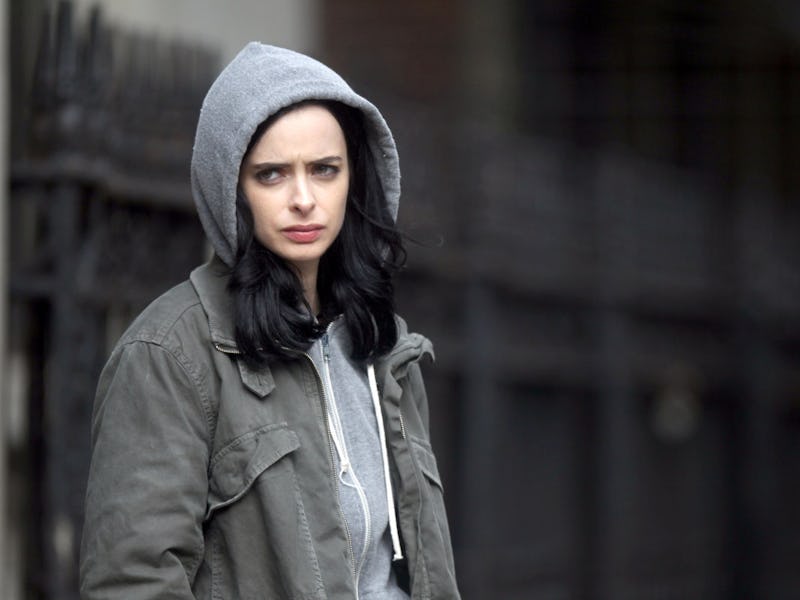Krysten Ritter Dominates Netflix's Complex 'Jessica Jones'
Both natural and over-the-top, the actress' performance makes Marvel's most daring show mesmerizing.

It’s how she walks. Krysten Ritter’s face is set with what she’s doing. But when she’s moving forward, when the camera pulls back to show all of Jessica Jones, her legs say who she is. There’s a sort of strut initially, a hip cock, an implicit threat from a small woman, but one with super strength. That’s the badass part, the part from the first teaser. But then instead of swinging her legs as she moves forward, she turns them inward, each foot-fall turning protective. Her steps get shorter, more precise, careful. She has fear to match her strength. It’s failed her.
This is not a subtle walk. This is not a subtle series. This is not a subtle performance. What it is is what superhero stories can be at their best, an examination of grand themes, using powers to accent essentially human stories. The current superhero craze has done a poor job of starting from themes. But Jessica Jones wears them on each wounded, powerful expression on Ritter’s face.
Ritter’s performance embodies Jessica Jones’ themes. Bodies are at the heart of the show, with the Purple Man’s (David Tennant) villainous power letting him control the bodies of his targets, as their minds remain free. Or there’s the other major Marvel hero introduced here, Luke Cage (Michael Colter), whose skin is literally unbreakable, which he demonstrates by showing it across multiple scenes.
But Ritter is the heart of the show, a throbbing raw wound of emotion, showing who her character is with every sharp retort, every collapse of her apparently confident facade. Jones is a private detective, with superpowers, but unwilling to use them for superheroics. It is a joyously over-the-top performance, reminding me of Walton Goggins’ turn as Boyd Crowder in Justified, somehow both studied and natural. They each have a moment where they dominate a scene: Goggins’ used rhetorical questions to launch into a speech.
Ritter gets served a cliché question — common enough in the Marvel Cinematic Universe — but then she twists her lips ever so slightly, cocks her head perhaps, waits for a second, then crushes her reply. “You should kill yourself,” she gets told, by someone with valid cause for bitterness, and Ritter shows the pain just briefly, before turning it with a sharp “Probably, but…” and a push to live in the moment, to survive, and not let failure define her. It’s not an isolated instance either: at least four times in the first two episodes Ritter — who’s accomplished at fast-paced comedy — lets the moment hang above her, like smoke in a noir, then makes it her own.
With such an intensely strong subject, Jessica Jones feels full from the moment it begins. It doesn’t serve as an advertisement for other Marvel projects (although Luke Cage will be getting his own series). Nor does it feel like a mere adaptation of better comics (although does borrow quite liberally from its source material). Instead it presents itself as a confident, if raw, story that stands as its own, which is far too rare in the MCU.
This confidence allows the show to pull from the headlines for its stories without turning into an eye-rolling Law and Order. In the first episode, Jones investigates a seemingly golden girl at a good university who’s suddenly withdrawn, almost directly referencing this well-read story on a young athlete’s seemingly inexplicable suicide. Here the mystery of depression is made manifest, in Tennant’s supervillain, but who can believe she was so directly controlled and abused?
But it’s the Purple Man himself whose presence seems timely. By the second episode it’s clear that his goal, his motivation, is to destroy a young woman who broke free of his control. And his masculine control, his ability to walk into any situation and be believed, to convince everyone they’re wrong and he’s right, and utilize that to stalk, terrorize, and destroy the woman standing in his way. He’s a living, breathing, threatening harassment campaign, forcing Jones to declare that she lives in constant fear, and has to push her friends away lest it spread to them. Through this, Jones remains a multidimensional combination of survivor, victim, and warrior. It’s worth noting that it’s rare to have a series with a female star, most of the main cast, the showrunner, and the director of the first two episodes. This likely helps center Jessica Jones on the main character’s anti-heroic subjectivity.
This is a complex mix of ideas working through a series in the orbit of arguably the dominant commercial film and television franchise of our generation. Yet it ends up being a ruthlessly human story, personal and general. And it all starts with its star. You can see it in how she walks.
Note: this article is based on the first two episodes of Jessica Jones. Expect more as viewing continues.